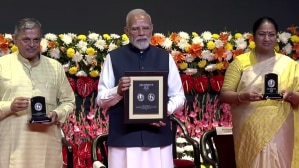Eviction of Malerkotla DC, SSP stands as high court rejects Punjab’s recall plea: ‘Challenge judicial order or comply with it’
Slamming Punjab over its failure to provide housing for judicial officers even four years after Malerkotla district was created, the high court pulled up its justice secretary over the “objectionable” plea.
 Chief Justice Nagu underlined that the state had acted improperly in seeking to undo a judicial order through administrative means. (File Photo)
Chief Justice Nagu underlined that the state had acted improperly in seeking to undo a judicial order through administrative means. (File Photo)Holding that a judicial order cannot be undone on the basis of an administrative committee’s decision, the Punjab and Haryana High Court Wednesday dismissed a plea by the Punjab government to recall its earlier order seeking the eviction of the Malerkotla deputy commissioner (DC) and senior superintendent of police (SSP) to make way for judicial officers.
A division bench of Chief Justice Sheel Nagu and Justice Sanjiv Berry, which had summoned Punjab’s Secretary (Justice) G S Khaira to appear before it virtually on Wednesday, recorded his apology for filing an application that the bench said contained “very objectionable paragraphs.”
Khaira told the bench: “My only intention is to apologise… There was no malice. The government had placed the matter before the building committee, land has been identified, drawings prepared and approvals taken. The gap was that the counsel could not apprise my lords of these developments on the last date.”
But Chief Justice Nagu underlined that the state had acted improperly in seeking to undo a judicial order through administrative means. “You only have two options in such a situation: either challenge this order before a higher court, or file an appropriate recall application. What you have filed seeks to go behind a judicial order by relying on an administrative decision. That cannot be done,” he said, rejecting the plea. At one point. Chief Justice Nagu asked whether the court should withdraw the judicial division.
‘Repeated failure to provide infra’ for judicial officers
On September 12, the high court, citing Punjab’s “repeated failure to provide infrastructure,” directed that the guest house occupied by the DC and the residence of the SSP at Malerkotla be vacated forthwith for the district and sessions judge. The bench recorded that, despite Malerkotla being carved out as a district in June 2021 and a sessions division notified in August 2023, the Justice Department had admitted in an affidavit that no suitable accommodation existed for judicial officers.
The court noted that while its Building Committee had resolved on September 2 to construct permanent courtrooms and residences within a year, it had also permitted diversion of executive officers’ houses if the deadline was not met.
‘No third option,’ says HC
When Punjab’s counsel Salil Sabhlok sought two months’ time to demonstrate the state’s bona fides and progress on infrastructure creation, the bench was unsparing. “If you want to do something, you can do it in two days,” the Chief Justice remarked, pointing out that the state had declared a revenue district in 2021 without making even basic infrastructure available.
“It has been four years. You have not been able to create facilities even for top officers, leave alone the judiciary. How can a sessions division be declared without judicial infrastructure?” CJ Nagu asked.
Sabhlok pressed the court for indulgence, saying: “Show some faith in us, my lords. Give us two months. We only want to show progress, not go behind the order.”
The chief justice, however, refused. “Showing bona fides in effect means recalling our order. That cannot be permitted. Either you challenge the judicial order, or you comply with it. There is no third option,” he told the state counsel.
Dismissing the recall application, the bench directed the state to comply with its earlier order and posted the matter in the week starting November 17.







